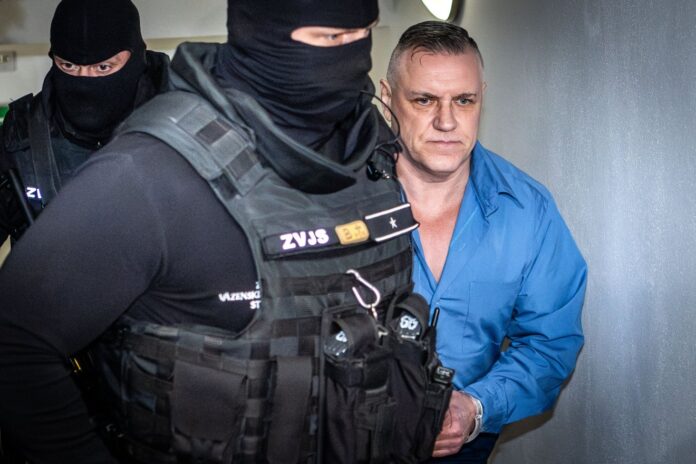Mikuláš Černák, Slovakia’s most notorious mafia boss, convicted of at least 23 murders, including brutal beheadings and immolations, could soon be the first person in the country’s history to be released on parole after serving a life sentence. Once a symbol of the lawlessness and terror that gripped the country in the 1990s, Černák has transformed his image, presenting himself as a remorseful man seeking redemption—now aspiring to run a pension and mentor former inmates. But as expert psychiatric reports support his claim of rehabilitation, prosecutors remain sceptical, questioning the fairness of the evaluations and the potential risks of releasing such a violent figure. With his courtroom appearances drawing growing public attention, Černák’s case has become a litmus test for Slovakia’s justice system: Can society afford to forgive a man responsible for a bloody criminal legacy, or does this open the door for dangerous precedents?
Mikuláš Černák, once labelled the “capo di tutti capi” of Slovakia’s criminal underworld, is the only person among 58 life-sentenced inmates in the country who now meets the formal conditions for conditional release. Though convicted of a staggering number of violent crimes, including at least twenty murders, Černák has since recast himself as a reformed figure, offering apologies and pledging to support the reintegration of other inmates into society.
The court process to determine his parole began in 2023 but was delayed pending expert psychological and psychiatric evaluations. These have now been submitted and, according to expert testimony, are largely favourable. The psychiatric and psychological assessments found no mental illness or personality disorder. Experts concluded that the likelihood of Černák leading a lawful life outside prison is high—though not guaranteed.
This week’s hearing at the Trnava District Court, held at its Piešťany branch, did not produce a final verdict. However, the atmosphere around the case underscored its historical weight. Courtrooms that once sat nearly empty during prior proceedings were now filled with journalists and members of the public—over forty people attended the most recent hearing. The trial has grown into a national spectacle, aided in part by a two-part cinematic drama based on Černák’s life currently showing in Slovak cinemas.
From Fear to Fascination
Černák’s story is as much about Slovakia’s troubled past as it is about its legal present. In the 1990s, he rose rapidly from a bus driver to the apex of a violent criminal syndicate. His gang carried out brutal killings, including beheadings and immolations. Business owners paid protection money out of fear. The state was seen as weak; police investigations were sporadic and dangerous. Even senior investigators like Peter Kovařík, now a former police president, admitted taking extra precautions like checking under his car for explosives.
That Černák has evolved into something of a public figure is notable. He is no longer just remembered as a feared mafia don, but increasingly occupies a space in Slovak popular culture—a subject of books, films, and journalistic retrospectives. In court, he presents himself not as a remorseless killer but as a man who regrets his past and aspires to build a pension business and help resocialise inmates. His words, often spoken softly and deliberately, attempt to convey introspection and remorse: “I wasn’t born a criminal… I despise my former life.”
Legal and Ethical Dilemmas
The parole hearing has also exposed procedural tensions. The prison director at Leopoldov—Slovakia’s most secure facility—previously supported Černák’s release, citing good behaviour and participation in work programmes. Černák has received multiple commendations and reportedly managed his aggression over the years through introspective coping methods. His intellectual and emotional capacity for reintegration, experts say, is well developed.
Yet concerns persist. The prosecution has requested additional psychiatric evaluations, arguing that the existing ones may be incomplete or biased. A particular focus has been placed on psychologist Karel Netík, who also has ties to the civic association Restart—an NGO that initiated Černák’s parole application. The prosecutor fears a conflict of interest, as Netík has agreements to work on Černák’s potential post-release reintegration. Netík denies any bias, saying he acted in accordance with professional ethics and reminded the court that psychology “is not an entirely objective science.”
Moreover, Černák remains in a high-security wing and has only spent limited hours in the prison’s transition programme. The court is considering whether this undermines claims that he is ready for reintegration. A follow-up hearing is scheduled for late May, possibly to be held inside the Leopoldov prison due to high public interest.
The Test Case for Justice
If granted parole, Černák would become the first person in Slovak history to be conditionally released from a life sentence. His case now stands as a benchmark for the credibility and maturity of Slovak justice. Proponents argue that a justice system must allow for the possibility of change; critics caution that releasing a man responsible for such extreme violence risks public safety and sends a troubling signal.
Even former investigators express ambivalence. “I wouldn’t want to be the judge,” said Peter Kovařík, who once helped dismantle Černák’s criminal empire. While acknowledging that the legal conditions for parole may now be met, he warns that “the risk he hasn’t changed is still there.”
Whether Černák will ever again be a free man depends on the coming court decisions. But one thing is clear: this case has already become a defining moment for Slovak legal history—and a mirror for a society still haunted by its violent post-communist transition.








